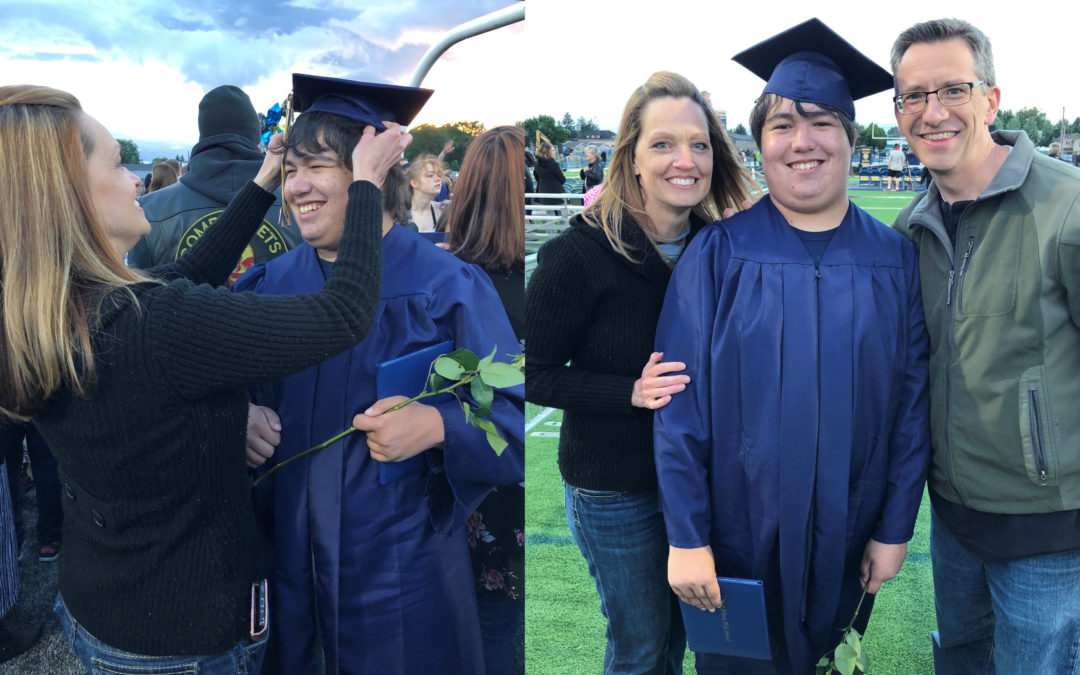This past June, Nathan Nelson graduated from Albany High School. A milestone his family wasn’t sure was possible his freshman year. “If we had not found Albertina Kerr I would have probably ended up in juvenile detention,” Nathan said. “I’ve gone from a depressed person to a changed, healthy, mature young man.”
Nathan had always been a kindhearted kid who loved animals, especially snakes and lizards. By the time he was 14, he had been diagnosed with both autism and bipolar disorder. At school, classmates were bullying him and he found himself in a sad, dark place. “I was a wreck,” Nathan said. “I had a lot of anger, frustration, and other emotions.”
According to Mental Health America, the nation’s leading community-based nonprofit dedicated to addressing the needs of those living with mental illness and promoting the overall mental health of Americans, half of all mental health disorders begin by the age of 14. And, one-third of the 3.4 million children and teens with depression in the United States may have early onset bipolar disorder. Also, nearly two-thirds of children with autism have been bullied, according to Autism Speaks, a national organization committed to increasing understanding and acceptance of people with autism.
Before coming to Kerr, Nathan’s outbursts were causing harm and distress to his family, as well as himself. “It was very scary,” said his mother, Kristie Nelson. “I know firsthand what it’s like to sit on the floor in a heap being afraid for your child who is struggling and feels like hurting himself or others.”
Parents who have children with bipolar disorder often describe them as unpredictable, alternating between aggressive, silly, or withdrawn behaviors. With autism, symptoms include difficulties with social skills, speech, behavior, and communication. When a child is experiencing co-occurring disorders, solutions become more complicated.
“We’d been in crisis mode for a long time because no one was equipped to deal with Nathan’s dual diagnosis,” Nelson said. For the child, it is challenging for them to do well in school and get along with others. It can also lead to self-harm. With help, children and teens can manage their symptoms and lead successful lives.
Kerr offers a continuum of mental health services for children, teens, and their families, including short-term crisis stabilization, as well as clinic- and community-based outpatient care.
Operating one of the only stand-alone child crisis psychiatric facilities in Oregon, Kerr’s team of professionals stabilizes children, like Nathan, in the midst of a mental health crisis. Nearly 700 children, teens, and families received mental health services from Kerr last year.
After three months in Kerr’s Crisis Psychiatric Care unit, Nathan learned techniques for coping with his complex emotions. “Kerr was a safe place,” he said. “They taught me that I don’t need to be perfect, but I do need to treat everyone with kindness and respect.”
Kerr’s team approach provided the Nelson family with wrap-around services. “When I sat for the first time around the table with the group at Kerr, I thought we finally have a team,” Nelson said. “They didn’t just stabilize him and send him back into the world, instead they came up with a plan and we started to feel a sense of hope.”
At Nathan’s graduation, his mother was filled with an indescribable sense of pride. “My son has been through so many challenges – he is so brave,” she said. “And, our family is whole because we were given a chance thanks to Albertina Kerr.”
Nathan is headed to college to study herpetology (reptiles). “Change is possible,” Nathan said. “The growth I’ve experienced in all aspects of my life is incredible.”
Since 1907, Albertina Kerr has been strengthening Oregon families and communities. Today, Kerr empowers children, teens and adults with intellectual and developmental disabilities, mental health challenges, and other social barriers to lead self-determined lives and reach their full potential

